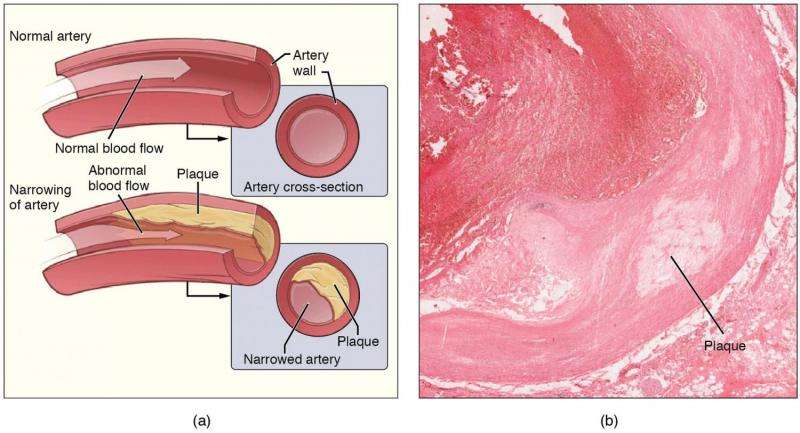This article has been reviewed according to Science X's editorial process and policies. Editors have highlighted the following attributes while ensuring the content's credibility:
fact-checked
peer-reviewed publication
trusted source
proofread
High cholesterol levels at a young age found to be a significant risk factor for atherosclerosis

Our risk of developing atherosclerosis—'furring' of the arteries—can begin much earlier in life than was previously thought, highlighting the need to keep cholesterol levels low even when we are young, new research has discovered.
The research also suggests that people who are taking lipid-lowering drugs such as statins to lower their cholesterol levels should remain on them, even if their cholesterol levels have fallen, as stopping treatment could increase their risk of atherosclerosis.
Atherosclerosis is one of the major causes of heart and circulatory disease. It involves the hardening and narrowing of the vessels that carry blood to and from the heart. It is caused by the build-up of abnormal material called plaques—collections of fat, cholesterol, calcium and other substances circulating in the blood.
Atherosclerosis is largely considered a disease of the elderly and so most screening, prevention and intervention programs primarily target those with high cholesterol levels, generally after the age of 50.
But in a study published in Nature, a team led by scientists at the University of Cambridge shows that high cholesterol levels at a younger age—particularly if those levels fluctuate—can be even more damaging than high cholesterol levels that only begin in later life.
To study the mechanisms that underlie atherosclerosis, scientists often use animal modes, such as mice. The mice will typically be fed a high fat diet for several weeks as adults to see how this leads to the build up of the plaques characteristic of the condition.
Professor Ziad Mallat and colleagues at the Victor Phillip Dahdaleh Heart and Lung Research Institute at the University of Cambridge decided to explore a different approach—to see whether giving mice the same amount of high fat food but spread over their lifetime changed their atherosclerosis risk.
"When I asked my group and a number of people who are experts in atherosclerosis, no one could tell me what the result would be," said Professor Mallat, a British Heart Foundation (BHF) Professor of Cardiovascular Medicine.
"Some people thought it would make no difference, others thought it would change the risk. In fact, what we found was that an intermittent high fat diet starting while the mice were still young—one week on, a few weeks off, another week on, and so on—was the worst option in terms of atherosclerosis risk."
Armed with this information, his team turned to the Cardiovascular Risk in Young Finns Study, one of the largest follow-up studies into cardiovascular risk from childhood to adulthood. Participants recruited in the 1980s returned for follow-up over the subsequent decades, and more than 2,000 of them had received ultrasound scans of their carotid arteries when they were aged around 30 years and again at around 50 years.
Analyzing the data, the team found that those participants who had been exposed to high cholesterol levels as children tended to have the biggest build of plaques, confirming the findings in mice.
"What this means is that we shouldn't leave it until later in life before we start to look at our cholesterol levels," Professor Mallat said. "Atherosclerosis can potentially be prevented by lowering cholesterol levels, but we clearly need to start thinking about this much earlier on in life than we previously thought."
The mouse studies showed that fluctuating levels of cholesterol appeared to cause the most damage. Professor Mallat says this could explain why some people who are on statins but do not take them regularly remain at an increased risk of heart attack.
"If you stop and start your statin treatment, your body is being exposed to a yo-yo of cholesterol, which it doesn't like, and it seems this interferes with your body's ability to prevent the build-up of plaques," he added.
The reason why this is so damaging may come down to the effect that cholesterol has on specific types of immune cells known as 'resident arterial macrophages.' These reside in your arteries, helping them to clear damaged cells and fatty molecules known as lipids, which include cholesterol, and stopping the build-up of plaques.
When the team examined these macrophages in their mouse models, they found that high cholesterol levels—and in particular, fluctuating cholesterol levels—changed them physically and altered the activity of their genes. This meant that the cells were no longer protective, but were instead detrimental, accelerating atherosclerosis.
More information: Early intermittent hyperlipidaemia alters tissue macrophages to boost atherosclerosis, Nature (2024). DOI: 10.1038/s41586-024-07993-x



















